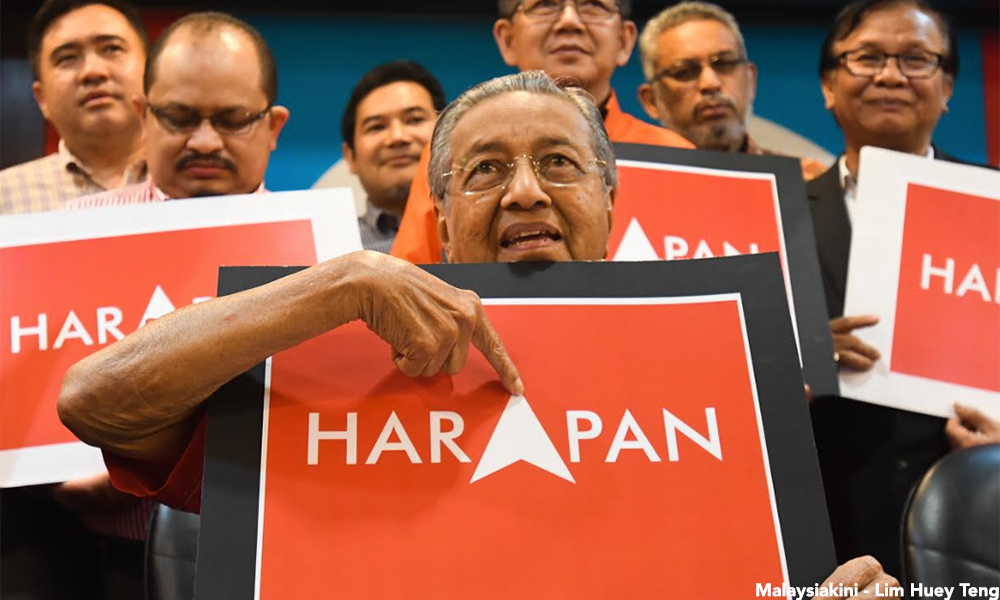
KINIGUIDE | Pakatan Harapan is one step closer to becoming a formal coalition and offering itself as a major contender for the throne in Putrajaya.
Coalition chairperson Dr Mahathir Mohamad announced a slew of election promises, including the abolition of the Goods and Services Tax (GST) and to impose a two-term limit for the prime minister’s post at a press conference on Thursday night.
But even if Harapan does win the 14th general election, what exactly can - or can't - it do in Parliament, assuming that the coalition only gets a simple majority.
Can it abolish the GST?
Yes. A simple majority in Parliament is sufficient for Harapan to introduce, amend or repeal laws, meaning that it can get rid of the GST despite warnings from economists against it.
Power to legislate also means it can abolish laws such as the Sedition Act.
Can it impose term limits for the prime minister?
Yes and no. Term limits can be put into practice on a matter of principle. However, this means there's nothing to stop anyone from doing a U-turn on this promise.
A law on the matter can be passed - but then, laws can easily be repealed.
"A law would not be sufficient to make it permanent," pundit Wan Saiful Wan Jan told Malaysiakini.
Penang Institute political scientist Wong Chin Huat said the best way to do this would be to amend Article 43 of the Federal Constitution, which governs matters regarding the cabinet.
This would be similar to how Article 125 states that Federal Court judges can only hold office up to the maximum age of 66 years and six months.
However, amending the Federal Constitution would require a two-thirds majority in Parliament, something a government with a simple majority will struggle to achieve.
Can it change the electoral system?
Yes. The current first-past-the-post (FPTP) election system, where winner takes all, has been a point of contention for many years.
This system could be Harapan's undoing at the upcoming general election if PAS splits the opposition vote, allowing BN to win despite, in some cases, getting less than 50 percent of the votes.
However, the problems surrounding FPTP can be resolved by amending Section 13(1) - of the Elections Act to switch to another electoral system.
Wong said Articles 116 and 117 of the constitution dictate that elections must be based on single-member constituencies.
"This means we have three options - FPTP, France's two-round system, and the Australian alternative vote," Wong told Malaysiakini.
Both two-round voting and the alternative vote would eliminate the spoiler effect of more than two parties contesting in an election and to ensure that the eventual winner will have at least ‘50 percent plus one’ of the votes.
Can the gerrymandering problem be resolved?
Maybe not. Article 113(2) of the constitution says that re-delineation exercises must be held at least eight years apart.
Thus, if the current BN government is able to push through and pass the current re-delineation exercise before GE14, Harapan will have its hands tied on this matter, unless it can somehow secure the two-thirds majority required to amend the Federal Constitution.
Wong explained that with a simple majority, Harapan could still trigger re-delineation exercises at the state level by increasing the number of state assembly seats, but this would have to be done by the respective state governments.
Can Harapan undermine the position of Malays, Islam and the royal institution?
No. Umno may claim that the opposition would undermine Malays, Islam and the royal institution if BN is ousted, but inability to amend the constitution means these institutions would be protected by the supreme law of the land.
International Islamic University Malaysia (IIUM) professor Shamrahayu Abd Aziz said even if Harapan could amend the constitutional provisions, it would not, in order to maintain its political mileage.
However, she expressed concern that while constitutional provisions would not be removed, the policies implemented by a Harapan government may not hold these provisions in high regard.
"The feeling of institutions of Islam and the Malay rulers being threatened is not because of the legal provisions, but because of the attitudes, the track record of the current debate on how people are talking about the freedom to propagate, freedom of religion and so on.
" I'm not worried about any amendment to the constitution, but the implementation of it," Shamrahayu told Malaysiakini.- Mkini



No comments:
Post a Comment
Note: Only a member of this blog may post a comment.